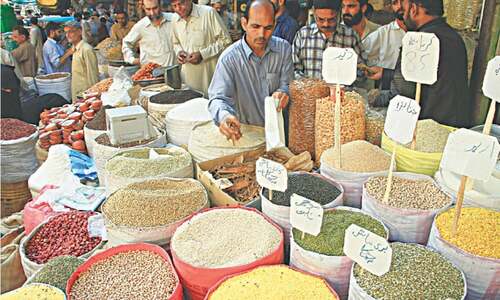• Retail price reaches Rs2,200 a kilo after commissioner raises official rate of mutton to Rs1,700 per kg
• Meat merchants hint at further increase in prices
KARACHI: Instead of taking any steps to bring down the rates or to ensure implementation of official rates, the commissioner of Karachi surprised consumers by increasing the mutton rate to Rs1,700 per kg on December 5 from Rs1,540 fixed on Oct 3.
While it is not clear whether the government has raised the rates to appease the meat merchants or taken the step under some pressure, Meat Merchant Welfare Association (MMWA) has rejected the new rates despite getting an increase of Rs160 per kg in mutton price.
Amid differences between the merchants rates and commissioner’s rates, consumers continue to suffer by paying Rs1,900-2,200 per kg for mutton in market due to lack of effective mechanism for price check.
MMWA president Haroon Qureshi told Dawn on Sunday that the association held multiple meetings with the commissioner of Karachi and his team after which a committee was formed to work out prices of red meat varieties.
He said the association’s suggestions were not given due consideration and valuable time was wasted in consultations when the commissioner office repeatedly insisted on reducing the rates further.
“It is hard to sell quality mutton at Rs1,700 per kilo when a goat (Bakra) weighing 10kgs costs Rs10,000 and after adding expenses and labour, its cost rises above Rs1,900 per kg,” he claimed.
Mr Qureshi added that the expenses on good quality veal (bachhia) with bones came at around Rs900 per kg making it difficult to sell the meat at the official rate of Rs800 per kg.
The meat of veal (bachhia) without bones is selling at Rs1,200 per kg as against the official rate of Rs950 per kg in the market.
He said the association had asked the commissioner to take notice of lifting of animals by exporters from a single cattle market in Karachi, which was creating a demand and supply gap.
“The commissioner is only interested in imposing heavy fines on retailers for overcharging instead of checking rising purchases of animals by exporters from the cattle market,” he said.
“It is actually the middle class which is facing hardship due to skyrocketing prices of meat as the elite class faces no problem in procuring costly meat,” Mr Qureshi said, asking the commissioner to resolve the price dispute amicably in the larger interest of lower and middle class groups.
Describing the commissioner’s rates as irrational and impractical, he asked as to how the meat rates could be determined without fair consideration of animal cost and associated expenses.
He said the association had not witnessed such a situation since 1969 wherein a separate notification of rates was issued only for one type of meat (beef/mutton) on November 11, 2023.
“This is done for the first time. The practice is that rates of all types of meat such as cow/calf of different grades are issued simultaneously.”
In view of rising food inflation and utility bills, which equally cause problems for meat sellers, he said new rates should be determined by issuing a new notification.
Authorities’ failure
In other essential items, the team of commissioner of Karachi also met with failure in ensuring availability of goods at control rates.
Caretaker Sindh Chief Minister retired Justice Maqbool Baqar on Nov 7 grilled the district administration for their failure in enforcing the official prices notified by their offices.
The chief minister directed the commissioners to activate their district administrations and take appropriate action to control the prices.
However a month has passed, consumers continue to face overcharging by retailers on almost all items.
On the other hand retailers do not bother to display official price lists a well.
In some cases, retailers did face fines of a few thousand rupees followed by sealing of some shops for overcharging, but no significant improvement was seen in price control mechanism.
After the action, retailers easily recovered the cost of fines by charging extra from consumers.
Difference in official and market rates
The retail price of flour No2.5 was fixed at Rs128 per kg, but it is selling at Rs140-150 per kg, while fine wheat flour is available at Rs150 as against the official rate of Rs138 per kg.
The official rates of high quality pulses, such as Mash, Moong, Masoor, and gram pulse are Rs495, Rs242, Rs275 and Rs204 per kg while consumers pay Rs500-560, Rs270-320, Rs320-360 and Rs220-260 per kg.
The control retail rates of live broiler and its meat have been fixed at Rs324 and Rs502 per kg, respectively, but retailers are demanding Rs340-380 and Rs500-600 per kg of live broiler and its meat.
Chairman of the Karachi Wholesalers Grocers Association (KWGA) Rauf Ibrahim said the commissioner of Karachi had issued a price list of grocery items on October 28 and it was supposed to be revised on November 15 and enforced from November 16, but nothing happened.
He said the price list of flour issued on October 28 was to be reviewed on every Friday, if required, and a new list was to be issued, but despite changes in rates not list was issued.
“Both grocery and flour price lists have remained the same after their issuance. They should be revised keeping in view price fluctuations in the wholesale rates,” he said, adding that the city government was facing a tough task to control retail prices.
The official retail rate of egg per dozen (58 grams each) is Rs290, but consumers are paying Rs30 per egg or Rs360 per dozen.
Published in Dawn, December 11th, 2023
















































